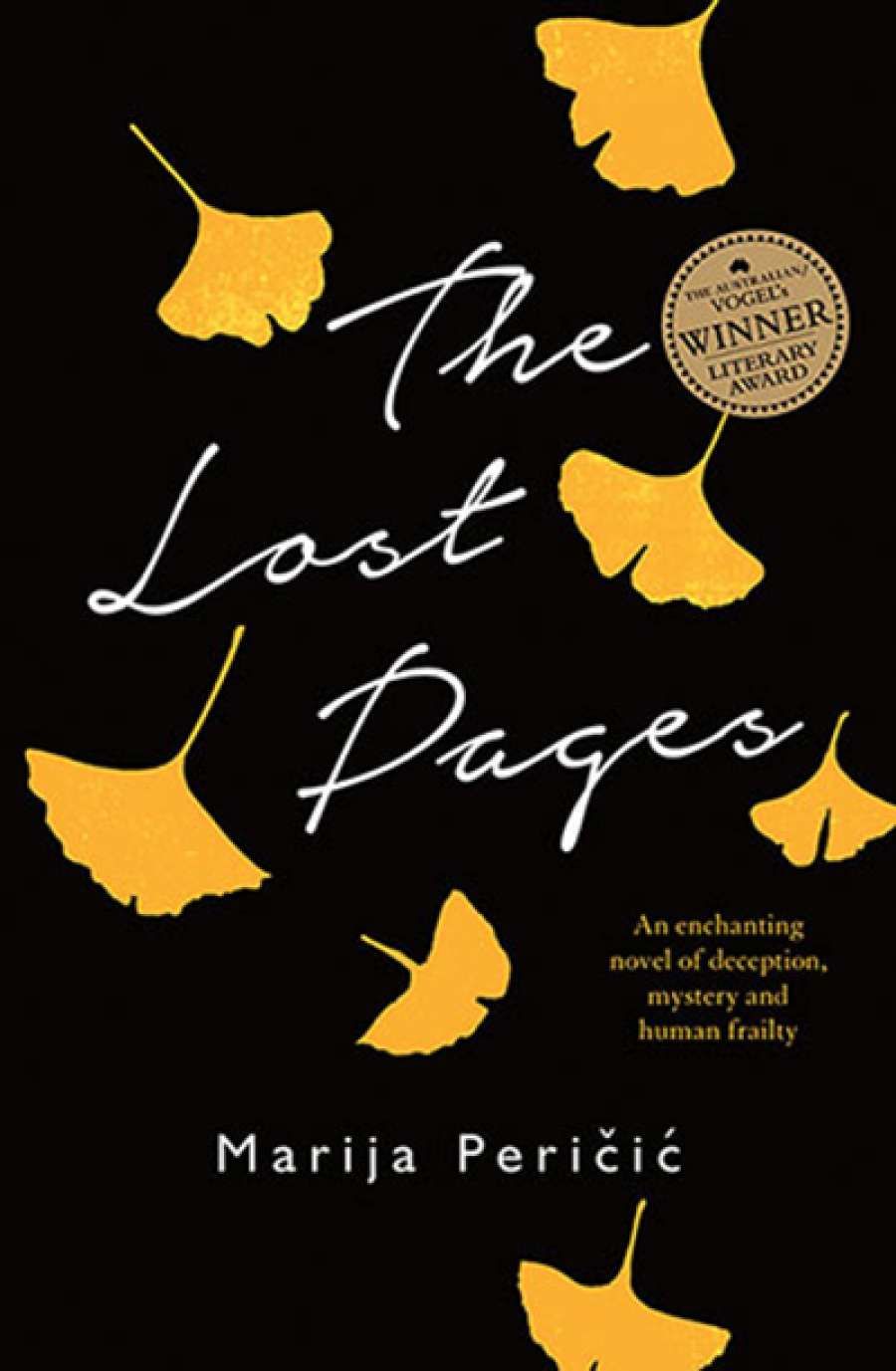
- Free Article: No
- Contents Category: Fiction
- Custom Article Title: Shannon Burns reviews 'The Lost Pages' by Marija Peričić
- Review Article: Yes
- Online Only: No
- Custom Highlight Text:
Alan Bennett once wrote of Franz Kafka: ‘One is nervous about presuming even to write his name, wanting to beg pardon for doing so, if only because Kafka was so reluctant to write his name himself.’ Even so, Bennett gave us Kafka’s Dick (1986), which – alongside a sputtering stream of demythologising critical interventions into Kafka studies ...
- Book 1 Title: The Lost Pages
- Book 1 Biblio: Allen & Unwin, $29.95 pb, 276 pp, 9781760296865
Marija Peričić’s The Australian/Vogel’s Literary Award-winning début novel also dramatises the relationship between Kafka and Brod, amplifying the latter’s (strikingly similar) jealousies and the former’s egoism in the process. The Lost Pages takes the form of a translated, faux-scholarly edition of ‘lost memoirs’, attributed to Brod and replete with editorial accoutrements.
In a fictional ‘foreword’, Professor Wendall Persson writes: ‘As the story goes, when Kafka lay in bed dying of tuberculosis, his friend Brod at his bedside, his last words were, “Burn all my work – everything – and spare none of it.” Thankfully, Brod defied the instruction.’ Even before it properly begins, then, it is clear that the version of Kafka that The Lost Pages has in mind is mythic or invented, with only the faintest connection to real-world figures and scholarship.
I found it difficult to embrace The Lost Page’s fictional conceit. For much of the novel I wondered why Peričić had chosen to use Brod and Kafka at all; they come loaded with so much baggage that it is impossible to gauge their significance to the narrative. Peričić’s formal strategies are similarly hard to embrace, not least because the prose style is often awkward (‘It was no longer the display of my ruined body to those appraising faces that was the source of my anxiety ...’ or ‘This became joined by the hissing whispers of Elsa and Sophie’), flecked with repetitions and redundancies (‘... her reaction was justified and even warranted’, or ‘Completely irrationally, I instinctively ...’), and occasionally vague (‘... the swinging skirts of the women corresponded in some musical way with the swaying of trees ...’).
 Franz Kafka (Wikimedia Commons)Peričić’s Brod is a cartoonish version of a Kafka character, who reiterates his feelings of shame over and over again: he is ashamed to be caught watching people without their knowledge, ashamed of his jealousies and sexual desires, his body and literary failures, and so on. There is typically at least a page between each appearance of shame or disgust, but not always: ‘And even if I somehow managed to steel myself against my shame, there still remained the problem of Franz. I did not wish Anja to be a witness to my shameful unmasking.’ Even Saul Friedländer, for whom Kafka is a ‘poet of shame and guilt’, would be dazzled by Peričić’s devotion to the theme.
Franz Kafka (Wikimedia Commons)Peričić’s Brod is a cartoonish version of a Kafka character, who reiterates his feelings of shame over and over again: he is ashamed to be caught watching people without their knowledge, ashamed of his jealousies and sexual desires, his body and literary failures, and so on. There is typically at least a page between each appearance of shame or disgust, but not always: ‘And even if I somehow managed to steel myself against my shame, there still remained the problem of Franz. I did not wish Anja to be a witness to my shameful unmasking.’ Even Saul Friedländer, for whom Kafka is a ‘poet of shame and guilt’, would be dazzled by Peričić’s devotion to the theme.
From the very beginning, Brod appears to be psychologically unhinged. His response to Kafka’s fiction – and to Kafka himself – is senseless and extreme. At times he seems to believe that Theodor [‘Brod’s publisher’]has room for only one author in his publishing stable. He says of Kafka:
I could tell you that I felt pleased and proud to bring his work to light, but it would be a lie. All I felt was the sick poison of jealousy, and the panic of self-preservation, and a determination to stop Franz at all costs. To show these stories to Theodor would have meant certain death for my literary career ...
In Kafka’s major novels and stories, the reader is typically left wondering whether the fictional world is mad, or the protagonist is mad, or both. In The Lost Pages, Brod is clearly untrustworthy; there is no ambiguity and, consequently, little readerly investment in his account, which severely undermines the power of its denouement. It is like knowing that the narrator of Chuck Palahniuk’s Fight Club (1996) is delusional, instead of merely depressed and alienated, from its opening paragraphs.
The Last Pages is occasionally funny, and Peričić is at her best when underscoring the connections between Brod’s physical deformities and Kafka’s fiction – particularly the Metamorphosis – but that represents a small fraction of the novel. Some readers may find the transposition of Kafka-like qualities onto Brod clever enough to sustain their interest, and there certainly are sizable chunks of enjoyable weirdness in the second half of the novel, but to my mind it disappoints on too many levels: the formal conceit is creaky, the attempted parody is superficial, the prose is underwhelming, and the narrative tension is needlessly diluted. Perhaps there is a deeper meaning, satirical thrust, or readerly pleasure to be found beneath the surface, but I failed to locate it.


Comments powered by CComment